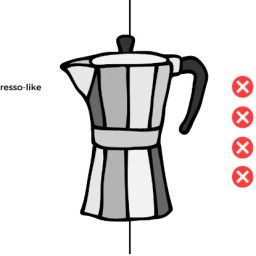
When it comes to enhancing your daily cup of coffee, the choice between coffee creamer and milk is not just about taste—it also involves considering nutritional content and dietary needs. Whether you lean towards the rich flavor of creamer or the natural goodness of milk, understanding their differences can help you make a healthier choice that aligns with your coffee preferences.
Key Takeaways about Coffee Creamer Vs Milk
- Nutritional Content: Coffee creamer and milk vary significantly in their nutritional profiles. Creamers often contain higher fat and calorie content due to added oils and sugars, making them a less favorable option for those monitoring their calorie intake. In contrast, milk offers a range of nutrients including calcium and protein, though the fat content can vary from skim to whole milk.
- Impact on Coffee’s Flavor and Texture: The choice between creamer and milk can drastically change your coffee’s taste and mouthfeel. Creamer typically offers a thicker, often sweeter sip, while milk tends to be lighter and can soften the coffee’s acidity, providing a smoother texture.
- Dietary Considerations: For those with dietary restrictions like lactose intolerance or dairy allergies, the choice becomes more crucial. Many non-dairy creamers still contain milk derivatives, which can be problematic, whereas lactose-free milk options are widely available.
- Environmental and Health Implications: The production of coffee creamers and milk also has varied environmental impacts. Non-dairy creamers, particularly those made from palm oil, may have a more significant environmental footprint due to deforestation and habitat destruction. Dairy milk production has its challenges too, primarily involving high water usage and greenhouse gas emissions.
Comparative Nutritional Analysis
When comparing the nutritional content of coffee creamer and milk, the differences are quite striking. Coffee creamers, especially non-dairy varieties, often contain higher levels of calories and fats due to the oils and sweeteners used. For instance, a typical serving of coffee creamer can range from 20 to 35 calories with varying amounts of fat depending on whether it’s liquid or powdered. In contrast, a similar serving of whole milk contains about 18 calories and 1 gram of fat, while skim milk offers even fewer calories and almost no fat.
Sugar content is another critical factor. Many creamers include added sugars to enhance flavor, leading to higher calorie counts. Milk, on the other hand, contains natural sugars like lactose, with no added sugars in its pure form.
Moreover, creamers may contain artificial additives such as colorants and stabilizers to improve shelf life and texture, which are not typically found in natural milk. These additives can be a concern for those mindful of consuming processed foods.
Milk, however, is rich in natural proteins and essential vitamins, including Vitamin D and calcium, which are beneficial for bone health. The presence of these nutrients makes milk a nutritious choice for coffee drinkers.
Influence on Coffee’s Taste and Texture
The choice between creamer and milk can significantly affect the taste and texture of your coffee. Creamers are designed to add a rich, creamy texture and are often flavored, which can heavily influence the coffee’s final taste. This can be appealing to those who prefer a sweeter, smoother beverage.
Milk, however, affects coffee differently. It softens the coffee’s bitterness and adds a subtle richness without overpowering the natural flavors of the coffee. The type of milk used—skim, whole, or something in-between—also allows for control over the creaminess and calorie content of the coffee without the need for additional sweeteners.
Suitability for Different Diets
Choosing between coffee creamer and milk can be significant for those following specific dietary guidelines. For individuals on low-calorie or low-fat diets, skim milk is often the best option. It provides the creamy texture and flavor enhancement to coffee without the high fat and calorie content typical of creamers. Moreover, skim milk still delivers essential nutrients like calcium and protein, which are absent in many creamers.
Non-dairy creamers, on the other hand, are suitable for dairy-free diets but vary widely in their ingredients and health implications. Many non-dairy creamers contain vegetable oils and thickeners like carrageenan, which some people prefer to avoid. Reading labels is crucial, as some non-dairy options might still contain trace amounts of dairy-derived ingredients or be high in added sugars and fats.
Sustainability and Production Impact
The environmental impact of dairy versus non-dairy products is complex. Dairy production is resource-intensive, involving significant water use, land for grazing, and methane emissions from cattle. However, it also supports biodiversity in some farming practices and can be part of sustainable agricultural systems.
Non-dairy products, such as those derived from almonds or soy, often use less water and land compared to dairy. However, they can have other environmental impacts, such as the significant water usage for almond farming in drought-prone areas or the deforestation linked to palm oil production found in some creamers.
Ethical considerations also play a role in production choices. The dairy industry faces criticism for animal welfare concerns, whereas non-dairy production might involve labor issues or contribute to environmental degradation through farming practices.
FAQs
Can coffee creamer be a complete substitute for milk?
Coffee creamer can substitute for milk in terms of texture and flavor, especially in coffee. However, it may not provide the same nutritional benefits, such as proteins and vitamins, found in milk. It’s also worth noting that some creamers contain dairy derivatives, so they aren’t always a non-dairy alternative.
Is coffee creamer suitable for vegans?
Not all coffee creamers are vegan, as some contain dairy derivatives like casein. However, many brands offer vegan creamers made from almond, soy, coconut, or oats, which are suitable for those avoiding all animal products.
How do creamer and milk affect the healthiness of coffee?
Adding creamer or milk can impact the healthiness of your coffee. Creamers, particularly flavored varieties, often contain added sugars and fats, which can increase caloric intake. Milk provides nutrients like calcium and protein but also adds fats and sugars, though in natural forms. Choosing low-fat or plant-based milks can be a healthier option depending on your dietary goals.
Final Thoughts
The choice between coffee creamer and milk depends on several factors including dietary preferences, nutritional needs, and environmental concerns. While creamers provide a rich flavor and texture, they often come with added sugars and artificial ingredients. Milk offers essential nutrients but also includes natural sugars and fats.
If you’re looking for flavor, creamers might be your go-to, especially if you prefer non-dairy varieties. For those monitoring calorie intake or seeking nutritional benefits, skim or plant-based milks like almond or oat milk are recommended. Consider your health goals, dietary restrictions, and taste preferences to choose the best option for your coffee.









